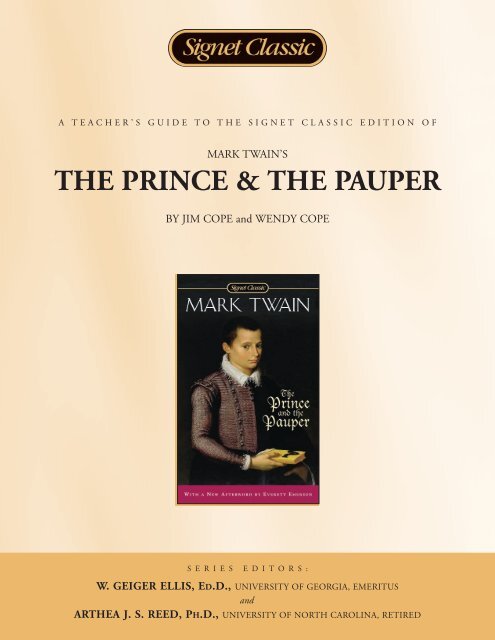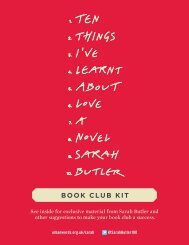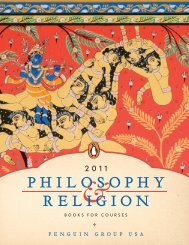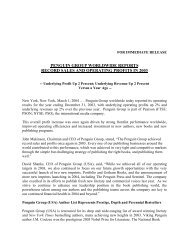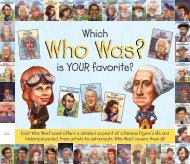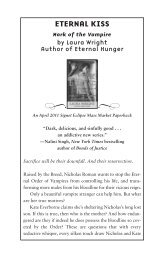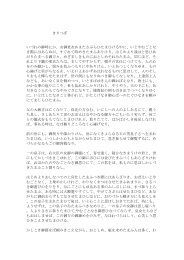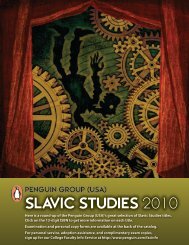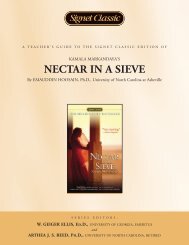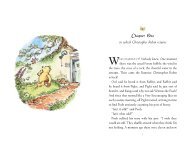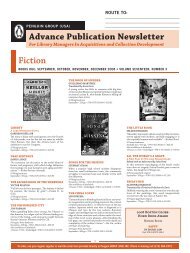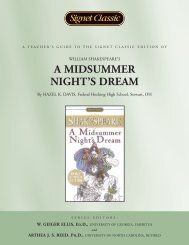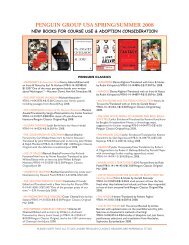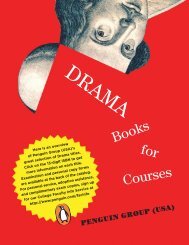Prince and Pauper TG - Penguin Group
Prince and Pauper TG - Penguin Group
Prince and Pauper TG - Penguin Group
Create successful ePaper yourself
Turn your PDF publications into a flip-book with our unique Google optimized e-Paper software.
A TEACHER’S GUIDE TO THE SIGNET CLASSIC EDITION OF<br />
MARK TWAIN’S<br />
THE PRINCE & THE PAUPER<br />
BY JIM COPE <strong>and</strong> WENDY COPE<br />
SERIES EDITORS:<br />
W. GEIGER ELLIS, ED.D., UNIVERSITY OF GEORGIA, EMERITUS<br />
<strong>and</strong><br />
ARTHEA J. S. REED, PH.D., UNIVERSITY OF NORTH CAROLINA, RETIRED
A Teacher’s Guide to the Signet Classic Edition of Mark Twain’s The <strong>Prince</strong> <strong>and</strong> The <strong>Pauper</strong> 2<br />
INTRODUCTION<br />
ABOUT THE NOVEL<br />
The <strong>Prince</strong> <strong>and</strong> the <strong>Pauper</strong> (1882), along with A Tramp Abroad <strong>and</strong> Life on the Mississippi, was written by Mark Twain<br />
as he put aside The Adventures of Huckleberry Finn after working through the first sixteen chapters. Its style, however,<br />
differs greatly from the Mark Twain most students have encountered in The Adventures of Huckleberry Finn. Instead of<br />
the folksy dialectical mastery Twain shows in that novel, his style in this book recalls that of Dickens, packed with setting<br />
<strong>and</strong> character description that makes 16th-century Engl<strong>and</strong> come to life. Both authors share biting realism cloaked in<br />
humor, effective political commentary, <strong>and</strong> an uncanny means of creating pathos in the reader.<br />
<strong>Pauper</strong> recalls the lighter tone of The Adventures of Tom Sawyer (1876), but retains the political edge that is unmistakably<br />
Twain. During Mark Twain’s writing of The <strong>Prince</strong> <strong>and</strong> the <strong>Pauper</strong>, he wrote to William Dean Howells:<br />
My idea is to afford a realizing sense of the exceeding severity of the laws of that day by inflicting some of<br />
their penalties upon the King himself <strong>and</strong> allowing him a chance to see the rest of them applied to others—all<br />
of which is to account for a certain mildness which distinguished Edward VI’s reign from those that preceded<br />
<strong>and</strong> followed it (Notebook 34, 377).<br />
The novel gets its realism from extensive research using Hume’s History of Engl<strong>and</strong>, Timbs’ Curiosities of Engl<strong>and</strong>, <strong>and</strong><br />
Dr. J. Hammond Trumbull’s Blue Laws, True <strong>and</strong> False. There are anachronisms; however, these do not detract from the<br />
overall effect of the book.<br />
Because of the parallels to Dickens’ themes <strong>and</strong> style as well as the excellent background into the Tudor period of Engl<strong>and</strong>,<br />
The <strong>Prince</strong> <strong>and</strong> the <strong>Pauper</strong> is recommended for students of British as well as American literature.<br />
ABOUT THIS TEACHER’S GUIDE<br />
This guide is organized with sections for each of three phases of teaching the novel: Before Reading the Novel, While<br />
Reading the Novel, <strong>and</strong> After Reading the Novel. The suggested pre-reading activities involve students with ideas that are<br />
pertinent to the novel <strong>and</strong> facilitate their engagement with it.<br />
The largest section offers a variety of activities <strong>and</strong> information for guiding the students during their reading. Organized<br />
by chapters, this section provides summaries, historical notes, questions, vocabulary study, quotations, <strong>and</strong> assorted activities.<br />
Although every chapter does not necessarily incorporate each of these features, there are ample suggestions to<br />
encourage reading <strong>and</strong> enhance underst<strong>and</strong>ing.<br />
• The Summaries are intended to help the teacher keep track of the narrative progression.<br />
• The Historical Notes can aid underst<strong>and</strong>ing of matters that are generally remote for today’s readers. The information<br />
for these notes was gathered from the University of California edition of The <strong>Prince</strong> <strong>and</strong> the <strong>Pauper</strong> (1984).<br />
• Questions may be used for whole-class discussion, for individual writing, or group activities.<br />
• Vocabulary words are listed with the page number of their first use in the text. Many of these words are older, courtly<br />
English expressions, <strong>and</strong> many archaic words have been defined. When possible, students should ascertain definitions<br />
through context. Less able students may benefit from a review of these words prior to their reading of the respective<br />
chapters, while more able readers may be able to h<strong>and</strong>le them when encountered in context.<br />
• Quotations, like the questions, may be discussed by the whole class or h<strong>and</strong>led in small groups or individually.<br />
• The Activities are a set of suggestions from which the teacher may choose. It probably will be too time-consuming<br />
to use all the activities. Also, some may be delayed <strong>and</strong> used as part of the post-reading experiences.<br />
The section titled After Reading the Novel offers means of pulling together the reading experience by examining various<br />
themes found in the novel. As noted above, some of the activities listed earlier may be used at this time.<br />
Finally, a bibliography is presented to assist those who wish to pursue interests more extensively.
A Teacher’s Guide to the Signet Classic Edition of Mark Twain’s The <strong>Prince</strong> <strong>and</strong> The <strong>Pauper</strong> 3<br />
BEFORE READING<br />
LANGUAGE ACTIVITIES<br />
1. Research changes in the English language, especially in spelling <strong>and</strong> pronunciation, from the 16th century to present day.<br />
2. Create a translation of Hugh Latimer’s letter at the Preface of the Signet Classic edition of The <strong>Prince</strong> <strong>and</strong> the <strong>Pauper</strong>,<br />
using st<strong>and</strong>ard English.<br />
3. Compare the differences in spelling, <strong>and</strong> develop spelling rules for 16th-century Engl<strong>and</strong>. Write a note to their<br />
friends using these rules.<br />
4. Discuss the importance of Latin in the workings of British government <strong>and</strong> in the everyday life of British royalty.<br />
RESEARCH ACTIVITIES<br />
1. Research the House of Tudor. This novel involves four characters who served as rulers of Engl<strong>and</strong>: Henry VIII, Lady<br />
Jane Grey, Mary, <strong>and</strong> Edward VI. What were their reputations as rulers?<br />
2. What role did the Duke of Norfolk have in the reign of Henry VIII? Why is he an important figure?<br />
3. What kind of life did common people of 16th-century Engl<strong>and</strong> lead? What recreational activities did they have?<br />
What kind of professions existed during this time? What were living conditions like?<br />
4. Research punishments of 16th-century Engl<strong>and</strong>. Why would this be an important part of common life?<br />
THEMATIC ACTIVITIES<br />
1. What role does punishment play in the lives of people today? How does it vary from one country to another? Iraq?<br />
USA? China?<br />
2. How much <strong>and</strong> what kinds of differences are there between the lives of the “rich <strong>and</strong> famous” <strong>and</strong> ordinary people?<br />
Are they treated equally in our courts?<br />
3. Given the opportunity, who would you like to trade places with for one day? What would you do? Why would you<br />
want to make this switch? How would that person fit into your world?<br />
4. What current stereotypes of different socioeconomic classes exist? Role-play each stereotype <strong>and</strong> give examples of how<br />
the media perpetuate them.<br />
WHILE READING<br />
CHAPTER 1<br />
SUMMARY<br />
Tom Canty, London pauper, is born on the same day as Edward (VI) Tudor. Edward is born with much celebration, yet<br />
Tom’s birth is only a burden to his poor family.<br />
QUESTIONS<br />
1. What are some ways that Twain highlights the differences between the two boys?<br />
2. What purpose does Twain have in comparing the two babies?<br />
3. Why is this chapter so short? What effect does its shortness have on the reader?
A Teacher’s Guide to the Signet Classic Edition of Mark Twain’s The <strong>Prince</strong> <strong>and</strong> The <strong>Pauper</strong> 4<br />
CHAPTER 2<br />
VOCABULARY<br />
• pauper (15)<br />
SUMMARY<br />
Tom Canty lives on Offal Court with his mother, abusive <strong>and</strong> drunken father <strong>and</strong> gr<strong>and</strong>mother, <strong>and</strong> his 15-year-old twin<br />
sisters Bet <strong>and</strong> Nan. Tom’s mother is a beggar, <strong>and</strong> his father, a thief. Tom begs enough to get by, but his only escape from<br />
his extreme poverty is through reading, taught to him along with writing <strong>and</strong> Latin, by Father Andrew, the local priest.<br />
Imagination <strong>and</strong> reading books give him another life besides starvation. Reading makes Tom act like a prince, in making<br />
wise suggestions <strong>and</strong> in his courtly speaking skills. He is admired as a hero to all except those in his own family. Tom sustains<br />
daily beatings but develops his own imaginary court to cope with his surroundings. The brutal reality of his life, contrasted<br />
with his vivid imagination, leads to bitterness <strong>and</strong> heartbreak.<br />
HISTORICAL NOTES<br />
• Both Pudding Lane <strong>and</strong> Offal Court have to do with entrails. Pudding Lane is a factual place in London, the starting<br />
point of the Great Fire of London in 1666.<br />
• During the 1530s <strong>and</strong> 40s, Henry VIII dissolved the monasteries <strong>and</strong> sold their l<strong>and</strong>s to supply the royal coffers.<br />
• Begging licenses were only given to the elderly <strong>and</strong> the sick during Henry VIII’s reign. Anyone without a license was<br />
subject to terms in the stocks, whipping, having their ears cut off, <strong>and</strong>, for repeat offenders, death by hanging.<br />
• Cheapside, during the time of Henry VIII, served as a commercial center in London. Fairs <strong>and</strong> public punishment<br />
were common sights here.<br />
• In this chapter Tom Canty observes Anne Askew, who refused to recant her heretical rejection of the doctrine of transubstantiation,<br />
burned at the stake. Henry VIII had made acceptance of the doctrine of transubstantiation law during<br />
his reign.<br />
QUESTIONS<br />
1. What does offal mean? How does Twain’s use of this word in naming where Tom Canty lives fit Canty’s situation?<br />
2. How can reading affect someone’s personality? How can reading take a person beyond their station in life? How does<br />
reading affect Tom’s personality?<br />
3. What kinds of “escapes” do people resort to today? How do they affect their outlook on their world? What is Tom’s<br />
escape? How does it affect his outlook?<br />
VOCABULARY<br />
• stealthily (17)<br />
• mendicancy (17)<br />
• stringent (17)<br />
• lament (18)<br />
• forlorn (19)<br />
• cuffing (19)<br />
• obeisances (19)<br />
• sordidness (20)
A Teacher’s Guide to the Signet Classic Edition of Mark Twain’s The <strong>Prince</strong> <strong>and</strong> The <strong>Pauper</strong> 5<br />
CHAPTER 3<br />
ACTIVITIES<br />
1. Keep a diary showing Tom’s changes in language, personality, <strong>and</strong> outlook from Father Andrew’s perspective.<br />
2. Research the types of “entertainment” Tom experiences while at Cheapside on page 18 in the Signet Classic edition.<br />
SUMMARY<br />
Tom w<strong>and</strong>ers away from home <strong>and</strong> finds himself at the palace. He catches a glimpse of the prince <strong>and</strong> begins staring. A<br />
soldier grabs Tom <strong>and</strong> throws him aside. The prince sees the soldier’s rudeness <strong>and</strong> invites Tom in to eat. They compare<br />
lives <strong>and</strong> Edward gets so excited about Tom’s “adventurous” life that he offers to exchange places with him.<br />
They change clothes <strong>and</strong> realize the similarity in appearance. Edward notices a bruise on Tom’s h<strong>and</strong> where the guard had<br />
grabbed him, <strong>and</strong> runs off to reprim<strong>and</strong> the guard. The guard opens the gate <strong>and</strong> boxes Edward on the ears, thinking he<br />
is the beggar Tom. Edward cries, “I am the <strong>Prince</strong> of Wales” <strong>and</strong> is mocked for it all the way down the road.<br />
QUESTIONS<br />
1. What are some of the similarities between Tom’s <strong>and</strong> Edward’s lives? What is Twain’s purpose in highlighting these?<br />
2. Why is Edward so excited about Tom’s life? What makes it appealing to him?<br />
3. What is the divine right of kings? Why is it ironic, then, that the guard mistakes Edward for the pauper Tom?<br />
HISTORICAL NOTE<br />
• The Punch <strong>and</strong> Judy shows that Tom observes are an anachronism. With its origins in Italy, the shows only reached<br />
Engl<strong>and</strong> after 1688. In the shows, Punch is a “hook-nosed puppet who beats his wife Judy to death, strangles his<br />
child, kills his dog, <strong>and</strong> brutalizes several other characters, all in a grotesquely comical fashion.”<br />
VOCABULARY<br />
• sauntered (21)<br />
• halberds (22): combination spear <strong>and</strong> battle-ax<br />
• mayhap (23)<br />
• prithee (24)<br />
• raiment (24)<br />
• lackeys (24)<br />
• enow (24)<br />
• cofferer (24)<br />
• maltreated (26)<br />
ACTIVITIES<br />
1. Draw a picture of the palace as described by Twain (21). 2. Compare Lady Jane Grey’s <strong>and</strong> Mary’s characters to their<br />
reputations as rulers of Engl<strong>and</strong> (24). Who would be the better monarch? Why? 3. Language mini lesson: Translate<br />
Edward’s courtly words into modern English <strong>and</strong> develop modern definitions for the courtly expressions.<br />
“Thy pardon, I had not meant to laugh. But thy good Nan <strong>and</strong> thy Bet shall have raiment <strong>and</strong> lackeys enow,<br />
<strong>and</strong> that soon too; my cofferer shall look to it. No, thank me not; ‘tis nothing. Thou speakest well; thou has<br />
an easy grace in it. Art learned?”(24)<br />
“Marry, that would not I mislike. Tell me more” (25).
A Teacher’s Guide to the Signet Classic Edition of Mark Twain’s The <strong>Prince</strong> <strong>and</strong> The <strong>Pauper</strong> 6<br />
QUOTATION<br />
“Oh, prithee say no more; ‘tis glorious? If that I could but clothe me in raiment like to thine, <strong>and</strong> strip my feet,<br />
<strong>and</strong> revel in the mud once, just once, with none to rebuke me or forbid, meseemeth I could forgo the crown!” (25)<br />
“Oho, wouldst like it? Then so shall it be. Doff thy rags <strong>and</strong> don these splendors, lad! It is a brief happiness, but<br />
will be not less keen for that. We will have it while we may, <strong>and</strong> change again before any come to molest.” (25).<br />
“The soldiers presented arms with their halberds, opened the gates, <strong>and</strong> presented again as the little <strong>Prince</strong> of Poverty<br />
passed in, in his fluttering rags, to join h<strong>and</strong>s with the <strong>Prince</strong> of Limitless Plenty.” (22).<br />
CHAPTERS 4 AND 5<br />
SUMMARIES<br />
Chapter 4: Edward is alone in the city he knows nothing about. When he comes upon some apprentices from Christ’s<br />
Hospital who mock him, he goes for his sword <strong>and</strong> is mocked further because he doesn’t have one. Edward challenges one<br />
of the boys <strong>and</strong> is torn to shreds. After the fight he remembers Tom’s talk of Offal Court <strong>and</strong> hopes to get there before he<br />
drops of exhaustion. John Canty comes across Edward <strong>and</strong> cuffs him for Tom’s being away so long. Edward is relieved<br />
that someone has come to take him back to the castle; Canty thinks “Tom” is being uppity.<br />
Chapter 5: Tom thinks the servants mock him when they leap to his service. When Lady Jane Grey enters, he begs her to<br />
help him. She thinks he’s crazy. King Henry agrees that “Edward” is unwell, especially when Tom insists on telling the<br />
truth. When the king asks him questions in Latin, Tom answers poorly, but in Latin, <strong>and</strong> doctors say it’s indicative of his<br />
state of mind. When the king asks questions in French, which Tom doesn’t know, his inability to reply shocks the king.<br />
The king remains convinced, however, that “Edward” will reign after the king dies. Tom/”Edward” is sent to his uncle,<br />
the Earl of Hertford.<br />
HISTORICAL NOTES<br />
• A gibbet is a gallows that has a post with a “projecting arm” on which the bodies of executed criminals were hung for display.<br />
• “Tom O’Bedlam” is a nickname for a resident of the Hospital of St. Mary of Bethlehem, an insane asylum in London.<br />
“Bedlam” is a shortening of Bethlehem; therefore “Tom O’Bedlam” is another way of calling someone a lunatic.<br />
QUESTIONS<br />
1. How does Edward’s perspective of his father bring irony to the situation at Grey Friar’s Church in Chapter 4?<br />
2. How does Edward’s reaction to John Canty lend humor to his situation?<br />
3. How do appearances affect the way both Edward <strong>and</strong> Tom are treated? How do they react to the way they are treated?<br />
How do “clothes make the man” in today’s society? How do people react to outward appearances?<br />
4. How does Twain inject humor into the situation of both boys? How does honesty play into that humor?<br />
5. Why do both boys feel trapped? Find examples of this in both chapters.<br />
6. How is nobility shown as pompous in these chapters? What does this seem to say about democracy?<br />
VOCABULARY<br />
• sally (28)<br />
• homage (28)<br />
• besmirched (29)<br />
• squalid (29)<br />
• ruffian (29)
A Teacher’s Guide to the Signet Classic Edition of Mark Twain’s The <strong>Prince</strong> <strong>and</strong> The <strong>Pauper</strong> 7<br />
CHAPTER 6<br />
• profaned (29)<br />
• stupefied (30)<br />
• vermin (30)<br />
• trifling (32)<br />
• supplicating (32)<br />
• sheweth (34)<br />
• baleful (35)<br />
• attainted (35)<br />
QUOTATION<br />
“Thou the king? Then I am undone indeed!” (33)<br />
ACTIVITIES<br />
1. Language mini lesson: Twain has an excellent ear. Read a few Twain short stories or excerpts from Twain’s autobiography<br />
to sample the skill Twain exhibits with language. What similarities are there in styles <strong>and</strong> themes between<br />
Twain’s other works <strong>and</strong> The <strong>Prince</strong> <strong>and</strong> the <strong>Pauper</strong>?<br />
2. Research the classical education of nobility. What is the nobility required to know?<br />
3. Compare Twain’s description of Henry VIII (33) with portraits done of him. What was Henry VIII’s cause of death?<br />
4. Research the Duke of Norfolk’s death. What happened to enemies of the crown in Henry VIII’s day?<br />
5. Research Henry VIII’s relationship with the Catholic church.<br />
SUMMARY<br />
Tom is present at a council meeting of all the nobility <strong>and</strong> has no idea how to proceed. The Lord St. John asks that everyone<br />
else be dismissed except for Hertford, St. John, <strong>and</strong> the “prince.” When the others leave, St. John discusses the king’s<br />
plan to help keep Tom out of the public eye, on account of his “illness.” Hertford passes word of this on to Edward’s sisters,<br />
<strong>and</strong> St. John covers for him on many issues of propriety. Lady Jane speaks to Tom in Greek, but he cannot underst<strong>and</strong>,<br />
<strong>and</strong> Elizabeth covers for him by replying.<br />
At the king’s banquet, Hertford <strong>and</strong> St. John cover for Tom most of the evening <strong>and</strong> prompt him to leave when things<br />
get too rough. The guardians then discuss “Edward’s” madness, <strong>and</strong> the effect madness has had on the crown in history.<br />
St. John has misgivings about Tom actually being the prince. Hertford doubts Tom as well, but because he feels that most<br />
impostors would be dem<strong>and</strong>ing that they were the prince, he attributes Tom’s behavior to madness.<br />
QUESTIONS<br />
1. What comment is Twain making about royal life in this chapter? Who makes the decisions?<br />
2. Why is English royalty so dependent upon ceremony? Find examples of rituals/protocol in this chapter <strong>and</strong> explain<br />
the importance of each. To what extent are they necessary? Why do they exist?<br />
3. Why does Tom insist he is not the prince? What does this show about his character? Why do others not believe him?<br />
VOCABULARY<br />
• vigilant (40)<br />
• giddy (41)<br />
• exaltation (44)
A Teacher’s Guide to the Signet Classic Edition of Mark Twain’s The <strong>Prince</strong> <strong>and</strong> The <strong>Pauper</strong> 8<br />
CHAPTER 7<br />
CHAPTER 8<br />
QUOTATION<br />
“They felt much as if they were piloting a great ship through a dangerous channel; they were on alert constantly, <strong>and</strong><br />
found their office no child’s play.” (41)<br />
SUMMARY<br />
Tom goes through the ordeal of getting prepared for dinner. He makes mistakes natural to someone who has not learned<br />
courtly manners, which confirms the rumors of “Edward’s” illness. Tom’s nose itch is treated like a minor crisis; he knows<br />
he is not to scratch it himself. Tom drinks the finger bowl <strong>and</strong> leaves before the blessing.<br />
In his chambers he tries on a suit of armor <strong>and</strong> cracks nuts that he stole from the dinner table. He finds a collection of<br />
books, one on the etiquette of the English court, <strong>and</strong> begins to read.<br />
QUESTIONS<br />
1. Why does Twain spend such a long time detailing the process of getting prepared for dinner? Why are so many servants<br />
present?<br />
2. What are the “Gr<strong>and</strong> Hereditaries”? What purpose do they serve? For what purpose does Twain include them?<br />
3. Why hasn’t Twain written about Edward in these last few chapters? How do these chapters illuminate Edward’s background<br />
<strong>and</strong> character, even though he’s not there?<br />
VOCABULARY<br />
• vagaries (46)<br />
• sumptuous (48)<br />
• zeal (48)<br />
ACTIVITIES<br />
1. Research a typical meal for English royalty versus a typical meal for English commoners. Note that Twain mentions<br />
that lettuce <strong>and</strong> turnips are new delicacies (46). What else would be “new” to the English table during the 1500s?<br />
2. Rewrite the chapter as if Edward had been present. What would he have done “correctly,” according to royal table<br />
manners?<br />
3. Etiquette mini lesson: Research proper table manners <strong>and</strong> conduct a “tea” with students applying their newfound<br />
knowledge.<br />
4. Semicolon mini lesson: Twain uses the semicolon frequently in dialogue throughout this chapter. Have students “collect”<br />
sentences using the semicolon <strong>and</strong> have them determine the rule for the correct usage of a semicolon.<br />
SUMMARY<br />
Henry VIII realizes he is dying but wants to make sure the Duke of Norfolk goes first. He resolves to go before Parliament<br />
to seal the warrant but suffers a spell <strong>and</strong> is unable to go. In order for the Lord Chancellor to carry out the king’s request<br />
to see Norfolk’s severed head before he dies, the Lord Chancellor must have the Seal, which Henry gave to the prince.<br />
Hertford goes to Tom to get the Seal, but Tom has no idea where or what it is. The king falls asleep, <strong>and</strong> Hertford awaits<br />
the king’s orders. When the king wakes, he berates Hertford for not having carried out his request <strong>and</strong> dem<strong>and</strong>s that the<br />
small, portable Seal be used to carry out his comm<strong>and</strong>.
A Teacher’s Guide to the Signet Classic Edition of Mark Twain’s The <strong>Prince</strong> <strong>and</strong> The <strong>Pauper</strong> 9<br />
QUESTIONS<br />
1. What is the Great Seal? What is its purpose?<br />
2. Why is the Great Seal important to the king?<br />
VOCABULARY<br />
• ashen (49)<br />
• pallor (49)<br />
• restoratives (49)<br />
• wrath (50)<br />
• miter (51)<br />
ACTIVITY<br />
CHAPTER 9<br />
Design your own Seal to carry out your own wishes. Make it reflective of who you are, <strong>and</strong> give it a slogan that reflects<br />
your philosophy.<br />
SUMMARY<br />
Twain describes with rich detail the wealth of the English realm, with Tom Canty at the center of it all, clothed in the<br />
prince’s garb.<br />
QUESTIONS<br />
1. What does the amount of description at the beginning of this chapter accomplish? Why include Tom at the end?<br />
2. How has Tom changed from the Tom of Offal Court?<br />
VOCABULARY<br />
• myriads (52)<br />
• pretensions (52)<br />
• purfled with minever (53): bordered with fur<br />
• pourpoints (53): quilted doublets<br />
• hauts-de-chasses (53): breeches<br />
• habited (54)<br />
• doublet (54)<br />
• hovel (54)<br />
ACTIVITY<br />
CHAPTER 10<br />
Write a description of the outfit that makes you feel your best in the manner describing Tom used in this chapter.<br />
SUMMARY<br />
John Canty drags Edward into Offal Court, where he asks Edward again to identify himself in front of his family. When<br />
Edward tells the truth, the family is shocked <strong>and</strong> worried that “Tom’s” reading has eaten away at his mind. Edward offers
A Teacher’s Guide to the Signet Classic Edition of Mark Twain’s The <strong>Prince</strong> <strong>and</strong> The <strong>Pauper</strong> 10<br />
to get Tom back for them if they go to the palace.<br />
John scoffs at “Tom” <strong>and</strong> makes fun of his airs but dem<strong>and</strong>s “Tom” turn over the money he had made begging so they<br />
can pay the rent. When “Tom” has no money, Canty <strong>and</strong> Tom’s gr<strong>and</strong>mother beat him, while Tom’s mother tries to protect<br />
him. Tom’s mother <strong>and</strong> sisters are beaten even more fiercely for it.<br />
When the family goes to sleep, the sisters <strong>and</strong> Tom’s mother comfort Edward by covering him <strong>and</strong> saving food for him.<br />
Edward thanks them <strong>and</strong> says they will be rewarded for their kindness by the king. The women are overcome with sorrow<br />
for “Tom’s” madness.<br />
Tom’s mother goes to bed with doubts as to whether this boy is really Tom <strong>and</strong> plans a test to determine his real identity.<br />
Tom fails the test, but she still convinces herself that the boy is Tom.<br />
Edward wakes up <strong>and</strong> calls to his manservant, thinking his adventure has all been a dream, <strong>and</strong> discovers it has been all<br />
too real. While he mourns his bad fortune, a man comes to the door <strong>and</strong> tells John Canty that the meddler Canty attacked<br />
was Father Andrew, who died as a result. Canty <strong>and</strong> the family run off into the night to avoid arrest. The town is alive<br />
with revelers, <strong>and</strong> Edward sees this as his chance to escape. When John Canty is persuaded to drink from the loving cup<br />
as a salute to the <strong>Prince</strong> of Wales, Edward escapes.<br />
Edward immediately suspects that Tom has taken advantage of his situation <strong>and</strong> has usurped Edward’s throne. He plans<br />
to have Tom hanged for treason as soon as Tom has had enough time to prepare himself spiritually.<br />
QUESTIONS<br />
1. Why does Edward correct John Canty for speaking to him directly?<br />
2. How are Edward’s <strong>and</strong> Tom’s situations similar? How are they both abused <strong>and</strong> comforted?<br />
3. What does Father Andrew’s death mean for Tom?<br />
4. What do Edward’s plans for Tom’s death say about his character?<br />
5. Why does Twain spend only one chapter on Edward’s experience as a pauper, while he spends many chapters on Tom’s<br />
experience as a noble? How does he consider his audience as he writes?<br />
VOCABULARY<br />
• cudgel (55)<br />
• loathsome (55)<br />
• frowzy (55)<br />
• malignant (55)<br />
• mummeries (55)<br />
• ruffianly (56)<br />
• freighted (56)<br />
• joviality (57)<br />
• sordid (57)<br />
• interposing (57)<br />
• infuriated (57)<br />
• eftsoons (60): soon afterwards<br />
• spurious (61)<br />
• usurper (62)<br />
ACTIVITIES<br />
1. Draw pictures of the Canty family based on Twain’s description.<br />
2. Where is ceremony important in our culture? Design a ceremony/celebration you’d like to see put into our culture.<br />
Why is this needed?
A Teacher’s Guide to the Signet Classic Edition of Mark Twain’s The <strong>Prince</strong> <strong>and</strong> The <strong>Pauper</strong> 11<br />
CHAPTER 11<br />
QUOTATIONS<br />
“O my poor boy! Thy foolish reading hath wrought its woeful work at last <strong>and</strong> ta’en thy wit away. Ah! Why dids’t thou<br />
cleave to it when I so warned thee ‘gainst it?” (56)<br />
“Thou shalt not suffer for me, madam. Let these swine do their will upon me alone.” (57)<br />
SUMMARY<br />
While Tom presides at a sumptuous banquet, Edward pounds on the gates of Guildhall, denouncing Tom as a fraud <strong>and</strong><br />
proclaiming that he, Edward, is the rightful prince. Miles Hendon defends Edward from the crowd, but, as it seems he<br />
will lose, a messenger from the palace declares King Henry VIII is dead, <strong>and</strong> Tom is proclaimed king. His first act as king<br />
is to free the Duke of Norfolk.<br />
QUESTIONS<br />
1. How are Tom’s <strong>and</strong> the nobles’ view of London different from the one Edward experiences as a pauper?<br />
2. How does Tom’s partaking of the loving cup in the court differ from the one in the previous chapter?<br />
3. How does Tom’s first act as king reflect his character?<br />
VOCABULARY<br />
• bawdkin (64): embroidered fabric made of woven silk <strong>and</strong> gold thread<br />
• bawdricks (64): ornamental belts worn diagonally across the chest<br />
• voyded (64): cut to show the garment underneath<br />
• cannell-bone (64): collarbone<br />
• mommarye (64): mummery, or mimed acting<br />
• taunt (65)<br />
• goad (65)<br />
• mortification (65)<br />
• mobtide (66)<br />
• revel (66)<br />
• liege (66)<br />
• prodigious (67)<br />
ACTIVITY<br />
CHAPTER 12<br />
Journal: Today is your first day as President of the United States. What do you do?<br />
SUMMARY<br />
Miles Hendon <strong>and</strong> Edward make use of the announcement to escape from the mob. Edward realizes he’s the king. As<br />
Hendon <strong>and</strong> Edward reach Hendon’s lodgings, Canty shows up to reclaim the boy. Hendon defends the boy against Canty<br />
<strong>and</strong> takes him into his home <strong>and</strong> vows to take care of him.<br />
After hearing Miles’ story, Edward vows to clear Miles’ name <strong>and</strong> proceeds to tell his own tale of misfortune. Miles still<br />
thinks Edward is crazy <strong>and</strong> vows to help him regain his health. Edward offers Miles his choice of rewards for saving him<br />
from the crowd.
A Teacher’s Guide to the Signet Classic Edition of Mark Twain’s The <strong>Prince</strong> <strong>and</strong> The <strong>Pauper</strong> 12<br />
HISTORICAL NOTE<br />
• The practice of displaying the decapitated heads of treasoners on London Bridge began in the late 14th century <strong>and</strong><br />
was not discontinued until the late 17th century.<br />
QUESTIONS<br />
1. Why does Miles Hendon take such good care of Edward even though he doesn’t think Edward is the king?<br />
2. Why does Edward expect to be waited on? How does Miles react to Edward’s expectations?<br />
3. Why does Miles ask to sit in the presence of the king? Why is that a huge privilege?<br />
4. Miles Hendon may well be Mark Twain’s homage to Cervantes’ Don Quixote de la Mancha. Discuss how each of<br />
these authors uses the courtly tradition for ironic <strong>and</strong> humanistic ends.<br />
VOCABULARY<br />
• waif (68)<br />
• soliloquizing (71)<br />
• ablutions (72)<br />
• alacrity (72)<br />
• covetous (73)<br />
• raiment (74)<br />
ACTIVITIES<br />
CHAPTER 13<br />
1. Research the legends of London Bridge <strong>and</strong> the uses of London Bridge as a deterrent to treason <strong>and</strong> other crimes.<br />
2. Discuss how notions of deterrence have or have not changed since the time of Tudor Engl<strong>and</strong>.<br />
QUOTATIONS<br />
“By the mass, the little beggar takes to one’s quarters <strong>and</strong> usurps one’s bed with as natural <strong>and</strong> easy a grace as if he owned<br />
them—with never a by-your-leave or so-please-it-you, or anything of the sort.” (71).<br />
“And so I am become a knight of the Kingdom of Dreams <strong>and</strong> Shadows!” (77)<br />
SUMMARY<br />
Edward dem<strong>and</strong>s that Miles help him undress <strong>and</strong> takes his bed for the third night in a row. Miles takes pity on Edward’s<br />
insanity <strong>and</strong> goes out to buy the boy some new clothes, even though Miles doesn’t have much money. He buys clothes<br />
with holes in them, planning to stitch them up.<br />
Miles returns to find Edward gone <strong>and</strong> discovers through a bumbling servant that a young man accompanied by a “ruffian”<br />
came to get the boy, claiming that Miles had sent them to get Edward. Miles realizes it is Canty, who claims Edward<br />
is his son Tom.<br />
HISTORICAL NOTE<br />
• The Tabard in Southwark, where Miles plans to take Edward, is most famous for being the meeting place of the pilgrims<br />
in Chaucer’s Canterbury Tales.
A Teacher’s Guide to the Signet Classic Edition of Mark Twain’s The <strong>Prince</strong> <strong>and</strong> The <strong>Pauper</strong> 13<br />
QUESTIONS<br />
1. Why does Miles think bigger stitches are better? Where in our culture do we think “bigger is better”?<br />
2. Why is Canty so determined to get “Tom” back?<br />
VOCABULARY<br />
• perplexity (78)<br />
• dissipated (78)<br />
• athwart (78)<br />
• betwixt (79)<br />
• plebeian (80)<br />
• trussed (80)<br />
• cozened (80)<br />
ACTIVITY<br />
CHAPTER 14<br />
Compare the scene in which Miles sews the garment up with the scene in Huck Finn in which Huck tries to pass for a<br />
girl with Ms. Judith Loftis. Why does Twain see humor in this sort of situation?<br />
SUMMARY<br />
Tom wakes, thinking his experiences have all been a bad dream, only to realize that they are real. He dreams of finding<br />
twelve pennies—a fortune—<strong>and</strong> giving them to his father without having to beg or steal them.<br />
He is dressed by his servants in a two-page ordeal <strong>and</strong> deals with the affairs of state; for example, the burial of his father<br />
<strong>and</strong> the paying of the bills. Tom is horrified that the late king will not be buried for quite a while <strong>and</strong> that the royal household<br />
owes more than it has in its coffers. Later in the afternoon, Edward’s whipping boy Humphrey asks Tom what will<br />
become of his family, since his services are no longer needed. After Tom grasps the concept of “whipping boy,” he vows<br />
to take his studies back up again so that his servant will not starve.<br />
Humphrey gives Tom enough information about Edward <strong>and</strong> his past to help him function. The Earl of Hertford feels<br />
confident enough with “Edward” to ask him about the whereabouts of the Great Seal. When Tom cannot answer,<br />
Hertford realizes he is straining “Edward” too much <strong>and</strong> changes the topic.<br />
HISTORICAL NOTE<br />
• The position of Lord Protector is the most powerful man in the kingdom.<br />
QUESTIONS<br />
1. How is Tom’s dream ironic, given his current situation?<br />
2. Why does Twain belabor the dressing process? How must Tom feel about this whole experience?<br />
3. Why is Tom’s suggestion about moving the royal household to a smaller place to deal with the financial problems<br />
scoffed at?<br />
4. How does Tom feel about the actual ruling of a country? What statement is Twain trying to make about government?<br />
5. How is the whipping boy’s predicament ironic?<br />
6. What are the lords trying to show the subjects by having “Edward” dine in public?
A Teacher’s Guide to the Signet Classic Edition of Mark Twain’s The <strong>Prince</strong> <strong>and</strong> The <strong>Pauper</strong> 14<br />
VOCABULARY<br />
• asunder (84)<br />
• illustrious (86)<br />
• morrow (86)<br />
• aggr<strong>and</strong>izements (87)<br />
• brevity (88)<br />
• perplexedly (89)<br />
• annulled (90)<br />
• peradventure (90)<br />
ACTIVITIES<br />
CHAPTER 15<br />
1. Twain’s fascination with twins extends to many “twin” experiences with both Edward <strong>and</strong> Tom as well as the people<br />
surrounding them. Find examples of these parallels <strong>and</strong> explain how they help highlight the irony of their circumstances.<br />
For extended research, check also in Twain’s Pudd’nhead Wilson.<br />
2. Compare <strong>and</strong> contrast Twain’s use of “twins” with Dickens’ use in A Tale of Two Cities.<br />
3. Research the reasons that the royal coffers of Henry VIII would have been depleted.<br />
SUMMARY<br />
Royalty from abroad arrive to honor “Edward’s” crowning on the third day of Tom’s kingship. He worries about the fourth<br />
day, since he has to dine in public <strong>and</strong> appoint Hertford as the Lord Protector. A riot breaks out the fourth day because<br />
of the impending execution of a man, a woman, <strong>and</strong> a young girl. Tom comm<strong>and</strong>s that they be brought forward <strong>and</strong><br />
learns that the man is accused of poisoning another man, <strong>and</strong> the woman <strong>and</strong> girl are accused of witchcraft.<br />
Tom recognizes the man as the one who rescued Giles Witt from the Thames on New Year’s Day at eleven o’clock. Since<br />
the poisoning was proven by being foretold by witchcraft, he sentences the man to death; but the man proves his innocence<br />
by providing the alibi of the Thames rescue, which took place at the same time as the poisoning. Tom sets him free.<br />
The accused witches are said to have caused a storm by pulling off their stockings. Because the woman’s home was<br />
destroyed by the storm as well, because the young girl could not enter a contract with the devil by English law, <strong>and</strong> because<br />
the woman could not create a storm on comm<strong>and</strong>, Tom frees the two. The crowd cheers his judgments, <strong>and</strong> “Edward’s”<br />
popularity soars among the kingdom.<br />
QUESTIONS<br />
1. Tom feels more <strong>and</strong> more a captive as king than he did as a pauper. What does this signify?<br />
2. What do Tom’s wise judgments say about democracy?<br />
VOCABULARY<br />
• fettered (93)<br />
• dreariness (94)<br />
• durst (95)<br />
• forebore (95)<br />
• indecorum (98)<br />
• wending (99)<br />
• cataclysm (101)
A Teacher’s Guide to the Signet Classic Edition of Mark Twain’s The <strong>Prince</strong> <strong>and</strong> The <strong>Pauper</strong> 15<br />
ACTIVITIES<br />
CHAPTER 16<br />
1. Research witchcraft trials of 1500s Engl<strong>and</strong>. How could an accused witch be freed?<br />
2. Compare <strong>and</strong> contrast the witchcraft trials in <strong>Pauper</strong> to those found in Arthur Miller’s The Crucible.<br />
SUMMARY<br />
Day Four: The dinner hour nears. Twain describes in great detail the preparation for the public meal. Tom eats successfully<br />
<strong>and</strong> thinks he’d gladly endure public scrutiny, since it freed him from the heavy duty of ruling for a while.<br />
QUESTIONS<br />
1. Why does Twain frequently take the reader “behind the scenes”? What does he accomplish by doing this?<br />
2. What is the purpose of the royal taster?<br />
3. What do paupers have in common with royalty?<br />
VOCABULARY<br />
• peals (104)<br />
• blithe (104)<br />
• formidable (105)<br />
ACTIVITY<br />
How do public figures dispel rumors? Find examples of famous people who tried to repair bad reputations. To what extent<br />
were they successful?<br />
QUOTATION<br />
CHAPTER 17<br />
“He seated himself at table without removing his cap, <strong>and</strong> did it without the least embarrassment, for to eat with one’s<br />
cap on was the one solitary royal custom upon which the kings <strong>and</strong> the Cantys met upon common ground, neither party<br />
having any advantage over the other in the matter of old familiarity with it.”(104).<br />
SUMMARY<br />
Miles follows the trail, now cold. A ruffian with his left arm in a sling, a green patch over one eye, <strong>and</strong> a limp <strong>and</strong> a staff<br />
to help him walk, follows behind a youth <strong>and</strong> Edward. The youth, named Hugo, says that Hendon has been hurt <strong>and</strong><br />
needs Edward’s help. Edward rushes toward the forest <strong>and</strong> finds a burnt farmhouse with a dilapidated barn. When he asks<br />
where Miles is, both men laugh at him. Mr. Canty reveals himself to Edward <strong>and</strong> confesses that he’s murdered the priest<br />
<strong>and</strong> is on the lam, disguised as Hobbs. Homesick, Edward falls asleep. When he awakes, he sees a fire in the barn, which<br />
is surrounded by a large group of more ruffians <strong>and</strong> criminal types, drunk <strong>and</strong> singing rowdy songs.<br />
Canty has rejoined the gang after many years, <strong>and</strong> the gang approves of his accidental murder of the priest. An escaped<br />
slave br<strong>and</strong>ed with an S on his cheek comes forward, seeking refuge in the gang. If the authorities find him, he will be<br />
hanged. Edward becomes indignant about the slave law <strong>and</strong> comes forth as king, saying that will never happen now that<br />
he is king. Edward is laughed at, <strong>and</strong> Canty/”Hobbs” explains that “Tom” (now “Jack”) has lost his mind. Edward tells<br />
John he’ll hang for his crime, <strong>and</strong> John attacks him. The Ruffler, the chief of the gang, saves the king <strong>and</strong> wins Edward’s<br />
approval by acknowledging his loyalty to the king. Edward thanks them, but the Ruffler tells him to take another name.
A Teacher’s Guide to the Signet Classic Edition of Mark Twain’s The <strong>Prince</strong> <strong>and</strong> The <strong>Pauper</strong> 16<br />
Someone suggests “Foo-foo the First, king of the Mooncalves,” <strong>and</strong> it sticks. The rest of the evening is spent making fun<br />
of Edward through mock worship.<br />
HISTORICAL NOTES<br />
• Henry VIII passed a law that consolidated the professions of the barber <strong>and</strong> the surgeon in order to better regulate<br />
both professions <strong>and</strong> to prevent surgeons from accidentally infecting their barbering customers after contact with seriously<br />
ill people.<br />
• “Dick Dot-<strong>and</strong>-Go-One,” according to Francis Grose’s Dictionary, is a nickname for people who have one leg shorter<br />
than the other, who tend to “waddle.”<br />
• Twain’s use of yokel in this chapter is an anachronism.<br />
QUESTIONS<br />
1. Why does Twain go back to Edward’s story at this point?<br />
2. What is honorable among this group of thieves?<br />
3. How are disguises used in this novel? How are multiple identities/aliases useful to Twain’s characters? In other Twain works?<br />
VOCABULARY<br />
• famished (106)<br />
• sirrah (107): sir; an address to those of a lower status<br />
• traversed (107)<br />
• prating (107)<br />
• budges (110): clothes-stealers<br />
• bulks <strong>and</strong> files (110): pickpockets <strong>and</strong> their mates<br />
• clapperdogeons (110): born beggars<br />
• maunders (110): beggars<br />
• dells, doxies, morts (110): women<br />
• proffered (114)<br />
ACTIVITIES<br />
CHAPTER 18<br />
1. Language mini lesson: Learn Cockney rhyming talk used by gangs to avoid being detected by police. Try to create<br />
your own slang code.<br />
2. Taking the perspective of one of the characters, create a rap using as many of the older English expressions as you<br />
can. How is modern rap similar to Cockney rhyming talk?<br />
3. Translate the quotation from the Ruffler into modern, st<strong>and</strong>ard English. “Five <strong>and</strong> twenty sturdy budges, bulks, files,<br />
clapperdogeons <strong>and</strong> maunders, counting the dells <strong>and</strong> doxies <strong>and</strong> other morts.” (110).<br />
SUMMARY<br />
The Ruffler puts “Jack” in Hugo’s charge while the gang invades a farmhouse, making the family serve them. Hugo takes<br />
“Jack” begging. The king refuses, so Hugo tells him to play decoy while he begs. Hugo writhes on the ground, but when<br />
a kindly stranger comes near <strong>and</strong> offers money <strong>and</strong> assistance to Edward’s “brother,” the king denies that they are related.<br />
He tells the stranger to “heal” Hugo by hitting him with a staff. Hugo runs off, <strong>and</strong> Edward is turned away at all of<br />
the farmhouses he stops by. He finally hides in a barn, taking a horse blanket to sleep on. He wakes up several times during<br />
the night thinking a corpse has been laid next to him, only to find a calf snuggled close.
A Teacher’s Guide to the Signet Classic Edition of Mark Twain’s The <strong>Prince</strong> <strong>and</strong> The <strong>Pauper</strong> 17<br />
QUESTIONS<br />
1. What does Edward discover about the life of a peasant?<br />
2. Why does Edward feel so peaceful with the calf?<br />
VOCABULARY<br />
• petulant (115)<br />
• ribald (115)<br />
• epithets (115)<br />
• levy (119)<br />
ACTIVITIES<br />
CHAPTER 19<br />
1. Make “Wanted” posters for Canty/”Hobbs,” the Ruffler, Hugo, or any of the other gang members. Make sure to<br />
include a picture as well as a list of their crimes.<br />
2. Compare 16th-century attitudes toward begging to today’s attitudes.<br />
SUMMARY<br />
Edward is discovered by two children. When he tells them he is the king, they believe him, but their mother considers<br />
him mad <strong>and</strong> takes pity on him. Still, she tries to find ways to make him tell the truth. Finally convinced he must have<br />
helped in the palace kitchen, she orders him to cook for them. He agrees, since King Alfred once did the same. He gets<br />
a tongue-lashing when he lets the dish burn. Because of their mutual embarrassment at their behavior, both drop their<br />
expectations—his for royal treatment, hers to treat him like a beggar. He agrees to wash the dishes <strong>and</strong> numerous other<br />
chores, again citing Alfred the Great’s example, until he sees Hugo <strong>and</strong> Canty come to the door. Edward escapes.<br />
QUESTIONS<br />
1. Why do the children believe Edward, though the adults do not?<br />
2. What is ironic in the way Edward <strong>and</strong> the farmwife treat each other?<br />
3. Why does Edward decide to perform the menial tasks?<br />
VOCABULARY<br />
• demented (123)<br />
• holpen (124): help<br />
• sagacity (125)<br />
• cordial (125)<br />
• staggerer (125)<br />
ACTIVITY<br />
Compare the reigns of Edward VI with Alfred the Great, the West-Saxon ruler. What are the similarities?
A Teacher’s Guide to the Signet Classic Edition of Mark Twain’s The <strong>Prince</strong> <strong>and</strong> The <strong>Pauper</strong> 18<br />
CHAPTER 20<br />
QUOTATIONS<br />
“When I am come to mine own again, I will always honor little children, remembering how that these trusted me <strong>and</strong><br />
believed in me in my time of trouble, whilst they that were older thought themselves wiser mocked at me <strong>and</strong> held me<br />
for a liar.” (123).<br />
“It does us all good to unbend sometimes.” (125).<br />
SUMMARY<br />
Edward meets a hermit who thinks himself an archangel. He believes Edward is king, but has forsaken the crown for a<br />
life of prayer. After learning Henry VIII is dead, the mad hermit ties up the sleeping Edward, intending to kill him because<br />
Henry VIII did not make the hermit pope.<br />
QUESTIONS<br />
1. Look at the changes Henry VIII made in the relationship between the throne <strong>and</strong> the church during his reign. Why<br />
would the hermit be angry at the king?<br />
2. What is Edward’s attitude towards the hermit’s tale?<br />
VOCABULARY<br />
• mortification (128)<br />
• archangel (129)<br />
• apprehensions (129)<br />
• venomous (130)<br />
• hovel (132)<br />
ACTIVITY<br />
CHAPTER 21<br />
Investigate the effects of the separation of church <strong>and</strong> state during Henry VIII’s reign.<br />
SUMMARY<br />
The hermit whets his knife, preparing to kill Edward. Miles Hendon enters the hovel, <strong>and</strong> the hermit tells Miles that he<br />
has sent Edward on an err<strong>and</strong>. Miles realizes the hermit has lied when the hermit tells Miles he’s an archangel. Miles waits<br />
until he decides that Edward has become lost. The hermit offers to help find him, but both are beaten by Canty <strong>and</strong><br />
Hugo, who “rescue” Edward.<br />
QUESTION<br />
How does Miles know that the hermit has lied about Edward being sent on an err<strong>and</strong>? Why is he so easily deceived?<br />
VOCABULARY<br />
• whetted (133)<br />
• placidly (133)<br />
• inarticulate (134)
A Teacher’s Guide to the Signet Classic Edition of Mark Twain’s The <strong>Prince</strong> <strong>and</strong> The <strong>Pauper</strong> 19<br />
CHAPTER 22<br />
• palter (134)<br />
• vagrant (134)<br />
• complaisance (135)<br />
SUMMARY<br />
Now that Edward is back with the gang, Hugo “tortures” the king by stepping on his toes. King Edward beats him in a<br />
quarterstaff fight <strong>and</strong> gains the respect of the rest of the gang, earning the nickname “king of Gamecocks.” Hugo feels<br />
vengeful toward Edward <strong>and</strong> puts a “clime” on Edward’s leg to torture him while making him beg. The slave from Chapter<br />
17 strips Edward’s b<strong>and</strong>age off because of Edward’s kindness toward him. The Ruffler appoints him to steal instead of<br />
beg, a worse punishment for Edward.<br />
Hugo is happy; now that Edward has to steal, he plans to get Edward arrested. Hugo steals a bundle from a woman, passes<br />
it off to Edward, <strong>and</strong> runs off. Edward drops it, but the woman sees him <strong>and</strong> catches him. The crowd wants to thrash<br />
him, but he is saved by Miles, who tells the crowd to leave it to the law.<br />
QUESTIONS<br />
1. Why is Hugo so intent on destroying Edward?<br />
2. Why is Edward so bent against begging or stealing? What does that say about his character?<br />
VOCABULARY<br />
• annulled (138)<br />
• unslaked (139)<br />
• cudgel (139)<br />
• mendicant (140)<br />
• stealthily (140)<br />
• pilfering (141)<br />
• tirade (141)<br />
• paltry (141)<br />
ACTIVITIES<br />
CHAPTER 23<br />
1. Develop a “Crook’s Cookbook” of tricks <strong>and</strong> scams, including a recipe for a clime.<br />
2. Write a diary from Hugo’s point of view explaining why he hates Edward so much.<br />
SUMMARY<br />
Miles tells Edward to be quiet so he can get out of the situation. When the constable comes forward to take Edward, Miles<br />
goes with them. In court, Edward is accused <strong>and</strong> found guilty. The contents of the bundle is a fattened, dressed pig worth<br />
three shillings <strong>and</strong> eightpence. The law states that the penalty for any stolen goods valued over 13 pence is hanging. The<br />
woman changes the total value to eightpence to save Edward. The constable follows the woman out of court <strong>and</strong> forces<br />
her to sell him the pig for eightpence or else suffer blackmail because she changed the value. Edward is astonished to be<br />
sentenced to a short imprisonment <strong>and</strong> a public flogging. Hendon advises him to stay calm <strong>and</strong> to let God’s will happen.
A Teacher’s Guide to the Signet Classic Edition of Mark Twain’s The <strong>Prince</strong> <strong>and</strong> The <strong>Pauper</strong> 20<br />
HISTORICAL NOTE<br />
• Henry VIII debased British currency by reducing the amount of silver in coins in order to reduce debts incurred in<br />
war <strong>and</strong> personal extravagance.<br />
QUESTION<br />
1. What is Twain’s intent in showing the blackmailing scene between the constable <strong>and</strong> the woman?<br />
VOCABULARY<br />
• abate (144)<br />
• consternation (144)<br />
• decorum (144)<br />
ACTIVITY<br />
CHAPTER 24<br />
Find examples of current events in which lawmakers or law enforcers do not abide by the rules.<br />
SUMMARY<br />
Hendon blackmails the constable about the pig purchase to let Edward escape. When the constable says it was a joke,<br />
Hendon says he’ll ask the judge if it seems like a joke. Hendon names the constable’s crime, “Non compos mentis lex talionis<br />
sic transit gloria mundi,” which, literally translated, means “Not of sound mind law of retaliation thus passes away<br />
the glory of the world”in other words, gobbledygook. The constable believes it. Miles adds, “Ad hominem expurgatis in<br />
statu quo” (To the man you cleanse in the existing state) for good measure.<br />
QUESTION<br />
1. What does the crime Hendon cites literally mean? How does this add to the humor of the situation? What does this<br />
say about Hendon’s education? About the constable’s education?<br />
VOCABULARY<br />
• indifference (146)<br />
• Ods body! (147)<br />
ACTIVITY<br />
CHAPTER 25<br />
Journal: Tell about a time you smooth-talked your way out of a sticky situation or that you were able to use your intelligence<br />
to your advantage.<br />
SUMMARY<br />
Out of town, Hendon waits on the king. Hendon tells Edward the hermit’s sorrow at the king’s escape, <strong>and</strong> the king tells<br />
him his side of the story. Hendon brags about Hendon Hall <strong>and</strong> its servants, thinking the king will be impressed. When<br />
Miles finally sees his brother Hugh, Hugh doesn’t recognize Miles <strong>and</strong> says he received a letter saying Miles is dead.<br />
Miles learns that his father <strong>and</strong> brother Arthur have died; his love, Edith, doesn’t recognize him; <strong>and</strong> neither do the ser-
A Teacher’s Guide to the Signet Classic Edition of Mark Twain’s The <strong>Prince</strong> <strong>and</strong> The <strong>Pauper</strong> 21<br />
vants (with 22 honest ones gone, only five “villains” remain), so no one is there to verify his identity. In Miles’ absence,<br />
Hugh has married Edith. Miles is furious, thinking Hugh wrote the letter himself <strong>and</strong> usurped Miles’ wife <strong>and</strong> l<strong>and</strong>. Hugh<br />
warns Miles it’s useless to escape the area. Miles scoffs at him, saying the l<strong>and</strong> belongs to him, <strong>and</strong> he will not leave.<br />
Edward realizes Miles’ predicament <strong>and</strong> believes his claim.<br />
QUESTIONS<br />
1. Why does Miles believe the hermit so easily, yet the king so reluctantly?<br />
2. How is this ironic in his Miles’ own situation?<br />
3. What purpose does Twain have in pairing Miles <strong>and</strong> Edward? Is there anyone similar who mentors Tom?<br />
VOCABULARY<br />
• blithely (149)<br />
• prodigal (152)<br />
• dissent (152)<br />
• fervency (153)<br />
QUOTATIONS<br />
“Mind not thy mischance, good man, there be others in the world whose identity is denied <strong>and</strong> whose claims are derided.<br />
Thou hast company.” (153)<br />
“For Miles Hendon is master of Hendon Hall <strong>and</strong> all its belongings. He will remain; doubt it not.” (155)<br />
ACTIVITIES<br />
CHAPTER 26<br />
1. Review Chapter 12 to recall Miles’ background.<br />
2. Construct the letter Hugh “received” telling him of Miles’ death.<br />
3. Write a script telling about the Hendon family’s reaction to the news of Miles’ death.<br />
SUMMARY<br />
The king finds it odd that he’s not missed. He writes a letter in English, Greek, <strong>and</strong> Latin to give to his uncle Hertford<br />
to reinstate himself. Hendon wants to work on his own dilemma, but the king says that his way, Hendon will get vindicated<br />
faster. Hendon holds onto the letter instead of delivering it, thinking that Edward is still deranged. Hendon thinks<br />
Edward does sound like a king, but still thinks his writing in Latin <strong>and</strong> Greek must be gibberish.<br />
Hendon thinks about Edith’s reception, uncertain whether she recognized him or not. Edith warns Miles that he is in<br />
danger <strong>and</strong> that he would be in danger even if he were the real Miles. Hugh’s power, she says, is so great that he could<br />
deny <strong>and</strong> denounce Miles <strong>and</strong> no one would be bold enough to recognize him. Edith’s marriage makes her a prisoner. She<br />
tells him to go <strong>and</strong> gives him money but still denies his identity. He tries to leave, but it is too late. Hendon <strong>and</strong> the king<br />
are taken to prison.<br />
QUESTIONS<br />
1. Does Edith recognize Miles? Why or why not?<br />
2. How could Edward’s letter help clear up his identity?
A Teacher’s Guide to the Signet Classic Edition of Mark Twain’s The <strong>Prince</strong> <strong>and</strong> The <strong>Pauper</strong> 22<br />
VOCABULARY<br />
• compulsion (157)<br />
• peradventure (157)<br />
• tinge (158)<br />
• fettered (158)<br />
• perchance (158)<br />
• give you countenance (158): to recognize<br />
ACTIVITY<br />
CHAPTER 27<br />
Write an entry for Edith’s diary showing what you believe her true feelings are about Miles’ identity.<br />
SUMMARY<br />
Edward <strong>and</strong> Miles experience jail life. A man almost murders a woman their first night there. The prisoners call Hendon<br />
“the impostor,” recalling Edward’s “Foo-foo the First” from his gang experience. The jailer brings old family servant Blake<br />
Andrews to acknowledge Miles, but Andrews denies Miles. The jailer says Miles will hang, <strong>and</strong> he <strong>and</strong> Andrews joke <strong>and</strong><br />
laugh. When the jailer leaves, Andrews acknowledges Miles <strong>and</strong> helps him by smuggling in food. Miles reserves the best<br />
morsels for the king, who cannot eat jail food.<br />
Andrews tells the family story to Miles: When Arthur died six years ago, Miles’ father wanted Hugh <strong>and</strong> Edith to marry,<br />
but Edith held out for Miles. When the letter arrived with news of Miles’ death, she held out for another three months,<br />
then married Hugh by Richard’s deathbed. Andrews tells Miles the rumor that Edith found drafts of the death letter<br />
among Hugh’s things. Hugh has been evil to everyone in the meantime.<br />
The king is befriended by two women imprisoned for minor offenses. He is happy to find them absent from the cell in<br />
the morning, believing they have been freed. He <strong>and</strong> the other prisoners are led outside to witness the women being<br />
burned at the stake.<br />
QUESTIONS<br />
1. How does Miles’ prison identity relate to Edward’s experiences?<br />
2. Who are the villains of this novel? Why are they villains?<br />
3. Who are the heroes of this novel? What makes them heroic?<br />
VOCABULARY<br />
• trifling (160)<br />
• taciturn (160)<br />
• carousing (161)<br />
• repudiate (161)<br />
ACTIVITY<br />
Draw a picture of Blake Andrews based on the Twain’s description of his appearance <strong>and</strong> character.
A Teacher’s Guide to the Signet Classic Edition of Mark Twain’s The <strong>Prince</strong> <strong>and</strong> The <strong>Pauper</strong> 23<br />
CHAPTER 28<br />
SUMMARY<br />
Still in prison, Miles is punished for his bad attitude, <strong>and</strong> the king almost gets put in the stocks. Hendon is put into stocks,<br />
<strong>and</strong> eggs are thrown at him. The king tries to defend Hendon, but Hendon protects the king by saying he’s mad <strong>and</strong> takes<br />
Edward’s lashes without a word. The king is thankful <strong>and</strong> dubs Hendon Earl. Hendon looks at the situation with irony,<br />
but sees love behind the gesture. The other prisoners, as a tribute to his bravery, no longer joke about Hendon being “the<br />
impostor,” <strong>and</strong> they thrash a prisoner who teases him unknowingly.<br />
HISTORICAL NOTE<br />
• The allusion to the king being scourged in this chapter refers to Henry II, who was scourged at the tomb of Thomas<br />
à Becket in 1174 as penance for inspiring Becket’s murder. Becket had stopped Henry from extending his power to<br />
control the Catholic Church in Engl<strong>and</strong>.<br />
QUESTIONS<br />
1. What are the stocks?<br />
2. Twain often shows criminals <strong>and</strong> other lowly people with a remarkable sensitivity for what is good <strong>and</strong> right. Find<br />
examples of this from events in the novel. What point is Twain making?<br />
3. Why is Edward’s gesture touching to Miles Hendon, if he doesn’t believe Edward is king?<br />
VOCABULARY<br />
• pillory (169)<br />
• vagabond (169)<br />
• rabble (169)<br />
• sardonic (170)<br />
• magnanimous (170)<br />
• scourge (171)<br />
• gibes (171)<br />
QUOTATION<br />
“Now am I finely tinseled indeed! The specter knight of the Kingdom of Dreams <strong>and</strong> Shadows is become a specter earl!” (171)<br />
ACTIVITY<br />
CHAPTER 29<br />
Make a model of a stockade <strong>and</strong> show why this served as punishment for such a long time.<br />
SUMMARY<br />
Hendon is released from the stocks, <strong>and</strong> he <strong>and</strong> Edward are set free. Miles considers going to London to ask help from<br />
the king. He remembers Sir Humphrey Marlow, a friend of his father’s, <strong>and</strong> hopes to get help from him. Hendon asks<br />
Edward where they’re going, out of respectful concern that the boy may not want to go back to London. The king answers,<br />
“To London!” <strong>and</strong> Hendon is surprised. As the two cross London Bridge again, a decaying head falls at their feet. They<br />
are surrounded by Londoners who fight, drink, <strong>and</strong> celebrate for Coronation Day.
A Teacher’s Guide to the Signet Classic Edition of Mark Twain’s The <strong>Prince</strong> <strong>and</strong> The <strong>Pauper</strong> 24<br />
QUESTION<br />
1. Why is it ironic that Miles is going to get help from the king in London?<br />
ACTIVITY<br />
CHAPTER 30<br />
Research the children’s song, “London Bridge is Falling Down.” What is the history behind this song?<br />
SUMMARY<br />
Tom has finally learned to enjoy his royalty. His whipping boy Humphrey is making a profit <strong>and</strong> giving orders is becoming<br />
more familiar. Tom orders special clothes <strong>and</strong> triples the servant staff. He still fights against unjust laws <strong>and</strong> develops<br />
skill at giving fearful looks to dissenters. When his “sister” Mary reminds him sternly of how full Henry VIII’s prisons<br />
used to be, he comm<strong>and</strong>s her to pray to remove the stone that was her heart. Tom recalls the true king <strong>and</strong> his own family<br />
at times, but largely forgets where he comes from. Twain juxtaposes Tom’s luxurious situation with Edward’s harder<br />
one.<br />
QUESTIONS<br />
1. If Humphrey the whipping boy is making a profit, what does that mean?<br />
2. If Tom’s rule is supposed to represent democracy, how does this chapter fit into Twain’s view of politics (<strong>and</strong> democracy)?<br />
3. In previous chapters, Twain kept the boys separate. Why does he choose to juxtapose their situations now?<br />
VOCABULARY<br />
• derided (175)<br />
• lofty (175)<br />
• adulation (176)<br />
• salaaming (176)<br />
• zeal (176)<br />
• penury (176)<br />
ACTIVITY<br />
CHAPTER 31<br />
Create a collage that shows the differences in the two boys’ experiences during their “experiment,” including the changes<br />
in their personalities <strong>and</strong> ways of thinking.<br />
SUMMARY<br />
In the pomp <strong>and</strong> circumstance of his coronation parade, Tom enjoys the good will of the people <strong>and</strong> thanks them. He<br />
sees folks from Offal Court <strong>and</strong> wants them to recognize him (but not a true recognition; he wants them to see him as<br />
king). He sees his mother, who does recognize who he truly is, but Tom denies her. Tom comes full circle; once again, he<br />
feels held captive, <strong>and</strong> his face shows his sorrow. Lord Protector (Hertford) tells him to cheer up because he’s affecting the<br />
crowds. Tom fakes it but admits privately the pauper woman is his mother. The Lord Protector thinks “Edward’s” mad<br />
again.
A Teacher’s Guide to the Signet Classic Edition of Mark Twain’s The <strong>Prince</strong> <strong>and</strong> The <strong>Pauper</strong> 25<br />
QUESTIONS<br />
1. What is recognition? How does Twain use recognition in this chapter?<br />
2. Why does Tom deny his mother?<br />
3. Why does he feel like a captive again after he denies his mother?<br />
4. Why is it so important for the king to portray a happy image?<br />
VOCABULARY<br />
• thither (178)<br />
• venerable (178)<br />
• largess (180)<br />
ACTIVITIES<br />
CHAPTER 32<br />
1. Journal: Describe a time you wanted to be recognized as something you weren’t. How did it feel when you got that<br />
recognition? If you weren’t recognized, how did that feel?<br />
2. Draw a picture of the variety of responses Tom has toward the experience of royalty as the story unfolds.<br />
QUOTATIONS<br />
“His gr<strong>and</strong>eurs were stricken valueless; they seemed to fall away from him like rotten rags.” (181)<br />
“Royalty had lost its grace <strong>and</strong> sweetness; its pomps were become a reproach.”(181)<br />
“Would God I were free of my captivity.” (181)<br />
SUMMARY<br />
Twain shows the scene before the coronation: preparation, richness, dreaminess. As Tom approaches the throne, he grows<br />
paler with woe, despondency, guilt, <strong>and</strong> remorse. As the Archbishop of Canterbury holds the crown over his head, all the<br />
visiting royals lift their coronets <strong>and</strong> poise them over their heads.<br />
The true king appears, forbidding the crowning. Tom agrees hastily, but the Lord Protector orders guards to take the real Edward<br />
away. Tom prevents them, swearing loyalty to Edward. The duke questions the king, <strong>and</strong> Edward answers perfectly. The<br />
Lord Protector says Tom can do the same, so his answers do not prove anything; but then he remembers the Great Seal.<br />
Edward tells about the secret compartment in his room. Lord St. John goes to get it, but the Seal is not there. The Lord<br />
Protector calls for the king to be scourged, but Tom holds him off. Lord St. John is perplexed <strong>and</strong> thinks aloud that it is<br />
amazing how such a bulky thing can go missing. Tom immediately remembers it <strong>and</strong> knows where it is, but says he didn’t<br />
put it there. Edward can’t remember, so Tom helps him by leading him through their first meeting. Edward remembers:<br />
“in an armpiece of Milanese armor that hangs on the wall thou’lt find the seal!” (192)<br />
When the Seal is found, the Lord Protector wants to throw Tom into the tower. Edward refuses, recognizing Tom as the<br />
protector of the throne. Edward also reminds Hertford that Tom made him a duke <strong>and</strong> that, unless he can prove he’s<br />
worth it through Tom, he’ll remain an earl. Edward is crowned, <strong>and</strong> the cannons sound, recognizing the new king.<br />
HISTORICAL NOTE<br />
• The Stone of Scone mentioned in this chapter is the Stone of Destiny, a s<strong>and</strong>stone block on which the kings of<br />
Scotl<strong>and</strong> were crowned until 1296, when Edward I brought it to Engl<strong>and</strong>. It is incorporated with the seat of the coronation<br />
chair in Westminster Abbey.
A Teacher’s Guide to the Signet Classic Edition of Mark Twain’s The <strong>Prince</strong> <strong>and</strong> The <strong>Pauper</strong> 26<br />
QUESTIONS<br />
1. Twain makes an obvious shift with his readers in this chapter: “Let us change the tense for convenience” (186).<br />
Identify other ways he makes the reader aware of his presence as author in previous chapters.<br />
2. What changes have occurred in both boys as a result of their experiences?<br />
3. Why does Lord St. John bow to both “kings” noncommittally?<br />
VOCABULARY<br />
• plebeian (187)<br />
• fealty (188)<br />
• obeisance (189)<br />
• varlet (192)<br />
ACTIVITY<br />
CHAPTER 33<br />
Several mentions have been made of promotions in noble rank. Research the ranks (duke, earl, etc.) <strong>and</strong> the privileges<br />
that go with each.<br />
SUMMARY<br />
Miles Hendon has been pickpocketed on London Bridge <strong>and</strong> lost Edward. Miles tries to think like him, believing Edward<br />
will be hurt by a crowd. He imagines rescuing Edward but cannot find him. Miles hears the cannon, thinks the new king<br />
has been crowned, <strong>and</strong> falls asleep.<br />
Hendon wakes up hungry <strong>and</strong> plans to meet Humphrey Marlow to borrow money. He goes to the palace, <strong>and</strong> Humphrey<br />
recognizes Miles from the king’s description. Miles asks a message be brought to the king. Officers find the letter from<br />
the king written in three languages, <strong>and</strong> Miles is brought to the king.<br />
QUESTIONS<br />
1. Why does Miles fear mob activity?<br />
2. What does Twain say about human nature through his demonstrations of mob behavior throughout the novel?<br />
3. What kinds of mob behavior are evident in our culture today?<br />
ACTIVITY<br />
CONCLUSION<br />
Write the letter Edward wrote to document <strong>and</strong> verify who he was. How would Edward argue that he is the rightful king?<br />
SUMMARY<br />
We are told Hugh Hendon confessed to threatening to kill Edith if she did not deny knowing Miles. When she refused,<br />
he threatened to kill Miles, so she assented. Hugh was not prosecuted, but left for Europe, where he died. Miles (now the<br />
Earl of Kent) marries Edith.<br />
John Canty disappears. The king finds all the people who were wronged or who helped him while he was “Tom Canty”<br />
<strong>and</strong> rewards them, <strong>and</strong> is honored by the people of the kingdom for it.
A Teacher’s Guide to the Signet Classic Edition of Mark Twain’s The <strong>Prince</strong> <strong>and</strong> The <strong>Pauper</strong> 27<br />
Tom <strong>and</strong> Miles are Edward’s favorites throughout his reign, <strong>and</strong> Miles exercises his right to sit in the presence of the<br />
monarch only twice, at the accession of Queen Mary <strong>and</strong> at the accession of Queen Elizabeth. Later, it is known as the<br />
“privilege of the Kents.”<br />
Even though Edward’s reign is only seven years long, he rules mercifully.<br />
Tom lives to be an old man but continues to dress the part of a former king for recognition.<br />
QUESTIONS<br />
1. Why did Twain choose the reign of Edward VI about which to write his novel?<br />
2. What qualities did the real king possess that struck him? Do such leaders exist today?<br />
VOCABULARY<br />
• relict (201): widow<br />
QUOTATION<br />
“What dost thou know of suffering <strong>and</strong> oppression? I <strong>and</strong> my people know, but not thou.” (203)<br />
ACTIVITY<br />
Write an essay comparing the real reign of Edward VI with the one represented in the book. How factual was Twain in<br />
his representation of the king?<br />
AFTER READING<br />
Explore the themes present in the novel through any of various activities: written, dramatic, or artistic. As appropriate,<br />
incorporate examples of events <strong>and</strong> quotations from the novel that highlight these themes:<br />
• Appearances are deceiving/Clothes make the man<br />
• Superiority of democracy (democracy teaches men to be wise rulers) versus the pomposity of monarchy (ceremony)<br />
• Triumph of the underdog<br />
• Innocence of children<br />
• Power of loyalty<br />
• Evil nature of humankind<br />
• Fantasy versus reality<br />
WRITTEN ACTIVITIES<br />
1. Rewrite part of the novel from a new point of view. For example, Tom Canty’s mother talking to a neighbor about<br />
the strange changes in her son.<br />
2. Cast a film version of the novel. Imagine the director/producer wants you to make recommendations on the actors<br />
<strong>and</strong> actresses. Include photos <strong>and</strong> descriptions of the stars <strong>and</strong> tell why each is “perfect” for the part. Write a report<br />
to convince the producers of your selections.<br />
3. Town criers were among the only sources of news during 16th-century Engl<strong>and</strong> because most of the population was<br />
illiterate. Create a news story reflecting the main events <strong>and</strong> present it to the class in “town crier” style.
A Teacher’s Guide to the Signet Classic Edition of Mark Twain’s The <strong>Prince</strong> <strong>and</strong> The <strong>Pauper</strong> 28<br />
DRAMATIC ACTIVITIES<br />
1. Read or tape a scene from The <strong>Prince</strong> <strong>and</strong> the <strong>Pauper</strong> with special effects. Choose a particularly interesting passage<br />
<strong>and</strong> read it with a musical background or sound effects.<br />
2. Prepare a television commercial about The <strong>Prince</strong> <strong>and</strong> the <strong>Pauper</strong> miniseries that would make people want to watch.<br />
3. Assign student courtroom roles for the trial of Hugh Hendon for usurping his brother’s property <strong>and</strong> stealing his<br />
fiancee. Use students in the roles of Miles, Edith, Blake Edwards, <strong>and</strong> other servants as witnesses with the teacher as<br />
the judge.<br />
ARTISTIC ACTIVITIES<br />
1. Make a scale model or drawings of Pudding Lane <strong>and</strong> Offal Court. Make sure to include details described in the<br />
novel as well as other information gathered from research of 16th-century Engl<strong>and</strong>.<br />
2. Create a board game with rules using situations <strong>and</strong> characters from The <strong>Prince</strong> <strong>and</strong> the <strong>Pauper</strong>.<br />
3. Ballads were a common means of keeping a story alive during 16th-century Engl<strong>and</strong>. Convert the novel into a ballad,<br />
writing the lyrics <strong>and</strong> music or adapting words to music written by someone else.<br />
EXTENDED LEARNING<br />
RELATED WORLD WIDE WEB SITES<br />
Tudor web page address: http://porky.as.utexas.edu/lara/tudor/tudor.html<br />
British Heraldry address: http://www.ucalgary.ca/~dkbrown<br />
Mark Twain Resources address: http://web.syr.edu/~fjzwick/twainwww.html<br />
VIDEOS<br />
The <strong>Prince</strong> <strong>and</strong> the <strong>Pauper</strong>. Warner Brothers, 1937. Directed by William Keighley. Starring Errol Flynn (Miles Hendon)<br />
<strong>and</strong> Claude Rains (Earl of Hertford). 120 minutes, b/w.<br />
The <strong>Prince</strong> <strong>and</strong> the <strong>Pauper</strong>. Disney, 1962. Directed by Don Chaffey. 93 minutes, color.<br />
Crossed Swords. Fox, 1978. Directed by Richard Fleischer. Starring Raquel Welch (Lady Edith), Ernest Borgnine (John<br />
Canty), George C. Scott (Ruffler), <strong>and</strong> Charlton Heston (Henry VIII). 121 minutes, color.<br />
BIBLIOGRAPHY<br />
RELATED WORKS<br />
The Adventures of Huckleberry Finn, Mark Twain: Fantasy versus reality, identity<br />
Pudd’nhead Wilson, Mark Twain: Innocence, the mob’s opinion<br />
A Connecticut Yankee in King Arthur’s Court, Mark Twain: Kings learn mercy by being subjected to their own laws.<br />
Oliver Twist, Charles Dickens: Style, triumph of the underdog, evil nature of humankind<br />
WORKS CONSULTED OR CITED<br />
Beer, Barrett L. Rebellion <strong>and</strong> Riot: Popular Disorder in Engl<strong>and</strong> during the Reign of Edward VI. Kent (OH): Kent State<br />
University Press, 1982.
A Teacher’s Guide to the Signet Classic Edition of Mark Twain’s The <strong>Prince</strong> <strong>and</strong> The <strong>Pauper</strong> 29<br />
Budd, Louis J., ed. Critical Essays on Mark Twain, 1867-1910. Boston: G.K. Hall <strong>and</strong> Co., 1982.<br />
Chermely, Cynthia. “‘Nawghtye mallenchollye’: some faces of madness in Tudor Engl<strong>and</strong>.” The Historian. May 1987:<br />
309-28.<br />
Curtis, Timothy, <strong>and</strong> J.A. Sharpe. “Crime in Tudor <strong>and</strong> Stuart Engl<strong>and</strong>.” History Today. Feb 1988: 23-9.<br />
Hickley, Sally. “Fatal Feeds? Plants, livestock losses <strong>and</strong> witchcraft accusations in Tudor <strong>and</strong> Stuart Britain.” Folklore. Vol<br />
101, no.2: 131-42.<br />
Hill, Hamlin. Mark Twain’s Letters to his Publishers: 1867-1894. Berkeley: University of California Press, 1967.<br />
Jordan, W.K., ed. The Chronicle <strong>and</strong> Political Papers of King Edward VI. Ithaca (NY): Cornell University Press, 1966.<br />
Mayhew, Henry <strong>and</strong> John Binny. The Criminal Prisons of London <strong>and</strong> Scenes of Prison Life. London: Frank Cass <strong>and</strong> Co.<br />
Ltd., 1968.<br />
Salomon, Roger B. Twain <strong>and</strong> the Image of History. New Haven: Yale University Press, 1961.<br />
Smith, Lacey Baldwin. Henry VIII: The Mark of Royalty. Boston: Houghton Mifflin Co, 1971.<br />
Thurley, Simon. The Royal Palaces of Tudor Engl<strong>and</strong>: Architecture <strong>and</strong> Court Life, 1460-1547. New Haven: Yale University<br />
Press, 1993.<br />
Twain, Mark. The <strong>Prince</strong> <strong>and</strong> the <strong>Pauper</strong>. Berkeley: University of California Press, 1984.<br />
Twining, E.F. The English Coronation Ceremony. London: Simkin Marshall, Ltd., 1937.<br />
ABOUT GUIDE AUTHOR<br />
WENDY PATRICK COPE received her A.B. <strong>and</strong> M.Ed. in English Education at The University of Georgia <strong>and</strong> currently<br />
serves as English department chair at Buckingham County High School in Buckingham, Virginia. Working with<br />
reluctant readers <strong>and</strong> writers at the secondary level is a special interest for her. She lives in Farmville, Virginia, with her<br />
husb<strong>and</strong>, Jim <strong>and</strong> her 17-year-old-cat, Doorknob. This is her third teaching guide for Signet Classics.
ABOUT THE EDITORS OF THIS GUIDE<br />
W. GEIGER ELLIS, Professor Emeritus, University of Georgia, received his A.B. <strong>and</strong> M.Ed. degrees from the University of North Carolina<br />
(Chapel Hill) <strong>and</strong> his Ed.D. from the University of Virginia. His teaching focused on adolescent literature, having introduced the first<br />
courses on the subject at both the University of Virginia <strong>and</strong> the University of Georgia. He developed <strong>and</strong> edited The ALAN Review.<br />
ARTHEA (CHARLIE) REED, PH.D. is currently a long-term care specialist with Northwestern Mutual Financial Network <strong>and</strong> senior<br />
partner of Long-Term Care <strong>and</strong> Associates. From 1978 to 1996 she was a professor of education <strong>and</strong> chairperson of the Education<br />
Department at the University of North Carolina at Asheville. She is the author or co-author of 15 books in the fields of adolescent<br />
literature, foundations of education, <strong>and</strong> methods of teaching. She was the editor of The ALAN Review for six years <strong>and</strong> president of the<br />
Assembly on Literature for Adolescents of the National Council of Teachers of English (ALAN). She is currently co-authoring the 5th<br />
edition of A Guide to Observation, Participation, <strong>and</strong> Reflection in the Classroom (McGraw-Hill 2004). She has taught almost every grade<br />
from second grade through doctoral c<strong>and</strong>idates. She lives in Asheville, North Carolina with her husb<strong>and</strong> Don, two dogs, <strong>and</strong> a cat.<br />
FREE TEACHER’S GUIDES<br />
A full list of Teacher’s Guides <strong>and</strong> Teacher’s Guides for the Signet Classic Shakespeare Series<br />
is available on <strong>Penguin</strong>’s website at:<br />
www.penguin.com/academic<br />
TEACHER’S GUIDES<br />
Animal Farm • Anthem • Beloved • Beowulf • The Call of the Wild • Cannery Row • City of God • The Country of the<br />
Pointed Firs <strong>and</strong> Other Stories • The Crucible • Death of a Salesman • Dr. Jekyll <strong>and</strong> Mr. Hyde • Dubliners • Ethan Frome •<br />
The Fountainhead • Girl in Hyacinth Blue • The Grapes of Wrath • A Journey to the Center of the Earth • The Jungle •<br />
The Life of Ivan Denisovich • Looking Backward • Lysistrata • Main Street • Of Mice <strong>and</strong> Men • The Mousetrap <strong>and</strong><br />
Other Plays • A Narrative of the Life of Frederick Douglass, An American Slave • Nectar in a Sieve • 1984 • The Odyssey •<br />
The Passion of Artemisia • The Pearl • Persuasion • The <strong>Prince</strong> <strong>and</strong> the <strong>Pauper</strong> • A Raisin in the Sun • The Red Pony • Redwall •<br />
The Scarlet Letter • The Scarlet Pimpernel • Silas Marner • A Tale of Two Cities • The Time Machine • Up from Slavery •<br />
The Women of Brewster Place • Wuthering Heights<br />
TEACHER’S GUIDES FOR THE SIGNET CLASSIC SHAKESPEARE SERIES<br />
Antony <strong>and</strong> Cleopatra • As You Like It • Hamlet • Henry V • Julius Caesar • King Lear • Macbeth • Measure for Measure •<br />
A Midsummer Night’s Dream • Much Ado About Nothing • Othello • Richard III • Romeo <strong>and</strong> Juliet • The Taming of<br />
the Shrew • The Tempest • Twelfth Night<br />
Visit the <strong>Penguin</strong> <strong>Group</strong> (USA) web site at www.penguin.com to browse all Signet Classic paperback editions<br />
<strong>and</strong> www.penguin.com/scessay for information about the Annual Signet Classic Scholarship Essay Contest


